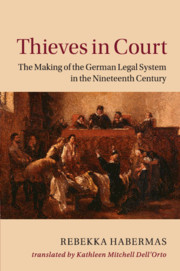Book contents
- Frontmatter
- Dedication
- Contents
- Acknowledgments
- Introduction: Questions Regarding Thieves, Reformers, Jurists, and Others
- PART I WHAT IS THEFT: QUESTIONS REGARDING THIEVES AND JURISTS – QUESTIONS REGARDING HONOR AND PROPERTY
- PART II HOW LAW IS MADE: EVIDENCE PRODUCTION
- PART III IN THE COURTROOM, OR WHAT IS LAW?
- Conclusion: The Making of the Modern Legal System – Thieves and Property
- Relevant Laws
- Bibliography
- Index
PART II - HOW LAW IS MADE: EVIDENCE PRODUCTION
Published online by Cambridge University Press: 18 November 2016
- Frontmatter
- Dedication
- Contents
- Acknowledgments
- Introduction: Questions Regarding Thieves, Reformers, Jurists, and Others
- PART I WHAT IS THEFT: QUESTIONS REGARDING THIEVES AND JURISTS – QUESTIONS REGARDING HONOR AND PROPERTY
- PART II HOW LAW IS MADE: EVIDENCE PRODUCTION
- PART III IN THE COURTROOM, OR WHAT IS LAW?
- Conclusion: The Making of the Modern Legal System – Thieves and Property
- Relevant Laws
- Bibliography
- Index
Summary
Since the end of the eighteenth century, jurists and other representatives of the middle class had concerned themselves intensively with legal questions to achieve the greatest possible public effect, whether the subject of discussion was the social background of female child murderers or rumors of witch-burning. In the first half of the nineteenth century, the brutality of torture, the horrific conditions in prisons, and a penal system denounced in some quarters as disproportionately cruel upset the public. People also actively discussed the course of the secret written court proceedings conducted in most of the German states up to the mid-century.
By contrast, questions relating to the preliminary investigation preceding the trial were of little public interest. Consequently, it was only logical that demands for reform took aim at criminal law, the prison system, and the manner in which justice was achieved in court. Furthermore, in many of the German states criminal law reforms and prison improvements were already occurring during the first half of the century, and finally, in 1848, trial reforms were implemented almost everywhere. The preliminary investigation, however, was not on the reformers’ radar. Certainly the preliminary investigation changed to some extent with the 1848 codes of criminal procedure; a tripartite division into the court investigative proceeding, the intermediate proceeding, and the main trial was established. Before then, there had only been a rough subdivision into preliminary investigation and main trial. The tripartite division sought to make cross-checks possible among the individual stages of the process. Furthermore, cross-checking was supposed to be facilitated by introducing a series of new positions – state procurator and investigating judge (Instruktionsrichter), to name the most important – that were intended to correct each other. By contrast, in the inquisitorial process of the Early Modern Period the preliminary investigation and the main trial were often directed by the same person.
In short, individual procedures in the preliminary investigation had been changed by the court system reform; however, the structural basis had apparently remained the same.
- Type
- Chapter
- Information
- Thieves in CourtThe Making of the German Legal System in the Nineteenth Century, pp. 95 - 99Publisher: Cambridge University PressPrint publication year: 2016



